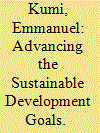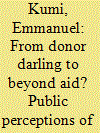| Srl | Item |
| 1 |
ID:
168249


|
|
|
|
|
| Summary/Abstract |
In September 2015, the Sustainable Development Goals (SDGs) were endorsed by the United Nations General Assembly as the cardinal agenda for guiding future global development. In financing the SDGs, there has been an increasing call on stakeholder diversification by leveraging on other non-state actors and private finance including philanthropic institutions in influencing, delivering and advancing the SDGs. Drawing on insights from the Ghanaian philanthropic sector, I show that philanthropic institutions play complementary roles in service delivery, support civil society organisations to engage in active action and advocacy, and enhance paradigm shifts in development thinking around the SDGs. I argue for the need in embracing complexity thinking that recognises that the attainment of the SDGs is dependent on the creation of an enabling environment and effective multi-stakeholder consultation.
|
|
|
|
|
|
|
|
|
|
|
|
|
|
|
|
| 2 |
ID:
172039


|
|
|
|
|
| Summary/Abstract |
In recent years, there has been growing interest among lower-middle income countries (LMICs) to reduce their dependence on donor resources, framed normatively as ‘beyond aid’. Yet, public perceptions about beyond aid narratives remain under-studied. This article explores current public perceptions in Ghana about the ‘Ghana Beyond Aid’ (GhBA) vision aimed at promoting structural economic transformation through the use of national resources while reducing dependence on donor aid. Drawing on 67 semi-structured interviews with government officials, civil society organisations (CSOs), donor representatives, academics, ‘ordinary citizens’ and media reviews, this article examines public understanding, rationale and perceived barriers to the implementation of the GhBA vision. I show that while GhBA is a welcome development for promoting structural economic transformation and ownership over national development priorities, mechanisms for propelling the GhBA are largely absent. Achieving GhBA will require a conscious effort by government and stakeholders to move beyond political rhetoric and partisan politics to setting out clear policy direction in addition to building a national consensus in promoting the vision. Implications of the research findings are discussed.
|
|
|
|
|
|
|
|
|
|
|
|
|
|
|
|